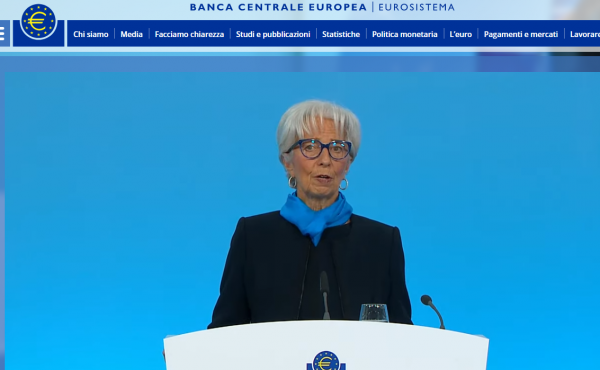The euro area is not facing the risk of stagflation and, although the asset purchases made with the PEPP will moderate the pace – as announced in the previous Governing Council meeting – the ECB is not launching any tapering: rather, a recalibration. This is what the president of the European central bank repeated today Christine Lagarde, in the press conference following the announcement of the monetary policy decisions taken by the Eurotower, in which he again attempted to reassure the markets about the temporary nature of the inflation flare-up. Sara.
Who knows if he will have convinced Austrian finance minister Gernot Bluemel which, according to Bloomberg reports, he is so worried about the inflation trend that he has lost sleep. Bluemel has appealed to the ECB to raise rates.
But Lagarde remained evidently impassive, and also sent back to the sender what the money markets are discounting: again according to Bloomberg, an increase in interest rates, in the euro area, equal to 10 basis points by next August and 21 basis points by the end of next year.
Regarding the outcome of today’s Governing Council meeting, nothing new, as predicted by the consensus of the analysts.
Interest rates on main refinancing operations, marginal lending facility and central bank deposits remained unchanged respectively 0.00%, 0.25% and -0.50%.
All the other bazookas in the ECB’s arsenal have also been confirmed, hence the ‘traditional’ APP asset purchase program, forward guidance and other tools.
Lagarde admitted that the issue of the leap in inflation – which is affecting the whole world, including the Eurozone – has been carefully scrutinized by the Governing Council.
The phenomenon of the jump in prices, he explained, it depends a lot on the demand trend, which is “disconnected from that of the offer”. With the reopening of the economy following the end of the Covid-19 pandemic lockdown, supply has virtually failed to keep pace with demand and vice versa, and this factor is among those, Lagarde said, explaining the increase in inflation.
Then there is the boom of “Energy prices, which certainly has to do with supply and demand, but also with other factors, such as supplies from Russia and demand from China ”. Finally, at the base of the inflation flare-up, there are the ‘base effects’.
The number one of the ECB was forced to admit, in summary, that “inflation will take longer to slow down than expected, due to the bottlenecks affecting supply chains and the growth in demand from consumers ”.
But he also added that “we continue to predict that, in the medium term, inflation will be below the target (equal to 2%)”, that the blaze will therefore be confirmed as temporary, continuing until the end of 2021, and then slowing down the pace in 2022.
Regarding stagflation, the euro area is not at risk: it is true that the momentum of GDP growth is slowing down, but “growth continues”, which means that “there is no stagnation”. Furthermore, “we also said that inflation will rise until the end of 2021, to then slow down in 2022 and remain in the medium term still below our target (by 2%). Consequently, I don’t think there is a risk of stagflation ”.
On the PEPP, the number one bazooka pandemic QE that the ECB launched last year against the economic and financial effects of the Covid-19 pandemic, Lagarde pointed out that “financing conditions remain favorable for businesses and families, and such as to endorse a slowdown in the pace of purchases that take place with the PEPPm with respect to purchases in the second and third quarters “. The number one of the ECB reiterated, however, that, precisely, that it is not a question of tapering but of recalibration.
Even today, in short, Lagarde reassured the markets about the temporary nature of inflation: It is a pity that macro data continue to haunt economists and strategists, making their effects felt, in general, on the pockets of consumers.
In the last few hours it has been made known the consumer price index of Germany, jumped 4.5%, over the expected + 4.4% and well above the ECB’s inflation target of 2%. In Spain, inflation rose by 5.5%.
